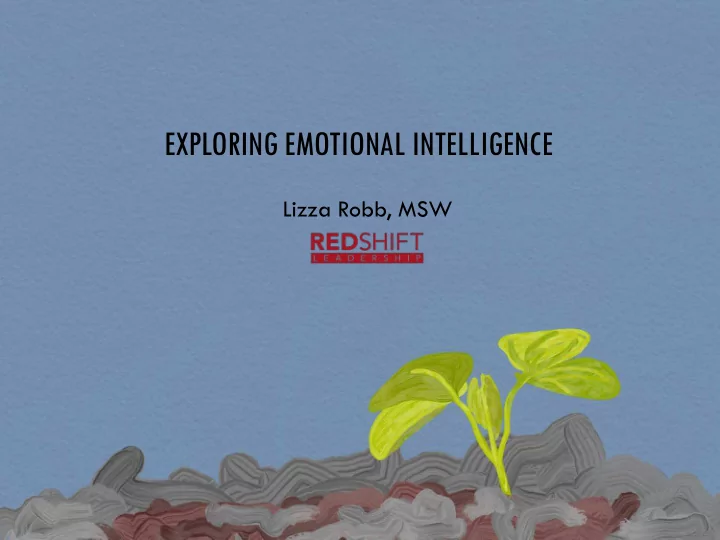

EXPLORING EMOTIONAL INTELLIGENCE Lizza Robb, MSW
EMOTIONAL INTELLIGENCE WHAT YOU SEE WHAT YOU DO Self-Awareness Self-Management Emotional self-awareness Achievement Orientation Adaptability Emotional Self-control Positive Outlook Relationship Social Awareness Management Empathy Coach and Mentor Organizational Awareness Conflict Management Influence Inspirational leadership Teamwork
SELF-AWARENESS Being fully aware of your own emotions and how they impact your behavior and performance Knowing your strengths and limitations, informed by being open to feedback Knowing your patterns, triggers and defensive routines— how other people’s emotions and behaviors impact you. Feeling comfortable with yourself and walking your talk Competency: Emotional Self-awareness 3
SELF-MANAGEMENT Paying attention to how your behaviors impact others Keeping disruptive emotions under control Consciously triggering positive emotional attractors—optimism, hope, passion Seeking and creating conditions for yourself to be at your best Behaving in ways that are consistent with the emotional tone of the situation Holding an ongoing “inner conversation” and being intentional about your self talk Competencies: Positive Outlook; Achievement Orientation; Adaptability; Emotional Self-control 4
SOCIAL-AWARENESS True empathy and compassion; fully listening to what others need to succeed Recognizing and acting on the social undercurrents: people’s emotions, beliefs, and drives; culture, relationships, and group dynamics Paying attention to how your department or team fits in with the larger context Picking up on cues in various contexts with different audiences (e.g., meetings, when presenting, with stakeholders) Competencies: Empathy; Organizational Awareness 5
RELATIONSHIP MANAGEMENT A knack for finding common ground with people Committed to helping people improve and meet their own goals; creating optimal conditions for desired outcomes Excellent at persuading and collaborating Alignment between what you say and do: Trust Competencies: Inspirational leadership; Teamwork; Coach and Mentor; Influence; Conflict Management
IT’S COMMON SENSE, BUT NOT COMMON PRACTICE. “While these ideas may be self-evident, they are not self-executing.” - President Obama WHY?
MYTH: YOUR MOOD DOESN’T MATTER TRUTH: EMOTIONS ARE CONTAGIOUS We are a social species We are at our best when we have strong connections with others
WHY DID/DO WE LIVE IN GROUPS?
AMYGDALA HIJACK An Amygdala Hijack is an immediate and overwhelming emotional response out of proportion to the stimulus because it has triggered a more significant threat. A trigger goes directly to the thalamus, which signals the amygdala to react with fight, flight or freeze This all happens before the signal reaches the rational brain. Primal Leadership by Daniel Goleman
EMOTIONS ARE CONTAGIOUS Emotions spread irresistibly whenever people are near each other Emotions are an “open loop” system; mirror neurons The Cognitive Structure of Emotions , by Andrew Ortony, Gerald L. Clore, Allan Collins The Emotional Brain , by Joseph E. Ledoux 11
KEEPING APERTURES OPEN OPEN CLOSED Hope Joy Fear Anger Compassion Excitement Resentment Jealousy Opportunity Challenge Cynicism Chronic stress and anxiety Calm Safety Impatience Frustration Pride Awe Mistrust Forced compliance Love Respect Hate Disdain or contempt Trust Gratitude Overwhelm Empathy Becoming a Resonant Leader by Annie McKee, Richard Boyatzis and Fran Johnston
HOW I WANT TO BE EXPERIENCED BY OTHERS What are the two words you would most hope people would use to describe you (at work)? What specific, observable behaviors demonstrate this quality? What behaviors undermine this quality? What might get in the way for you?
KNOW YOUR TRIGGERS Think about a time when your response to a person or situation was out of proportion and/or irrational. What happened? What catalyst of triggers set it off? How did you feel in the moment? What were your emotions? What were your physical sensations connected with those emotions? What was your reaction to the situation? What were the consequences of your reaction?
SELF-MANAGEMENT STRATEGIES Be aware of your triggers, over time work to deconstruct them Keep your inner conversation active—track your emotions so you’re not caught off guard When your emotions are high, slow down and take a beat before responding Keep your higher goals in mind, don’t allow yourself to get distracted or triggered and taken off track Take full responsibility if you do lose your cool—say you’re sorry. Talk it through with the person and allow them to give you feedback about how it affects them
TIPS TO QUICKLY BOOST YOUR MOOD Remember that moods are temporary; don’t attribute significance Change your physical position Posture Expression Move your body Do something uplifting Watch an uplifting video (Check out sites like Upworthy.com, DailyGood.org or ActionforHappiness.org; watch a funny clip) Music Talk with a friend Change your setting Move to a different room Go outside Express gratitude (especially in writing)
PRACTICE
Recommend
More recommend